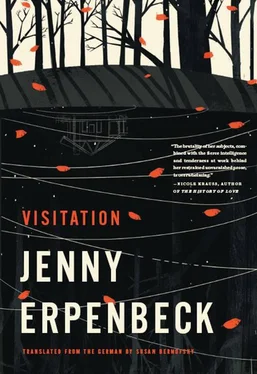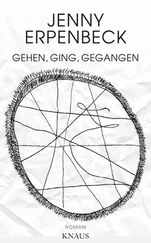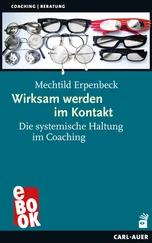Before she met her husband, for whom she started working as a stenographer as soon as she completed her training, she would never have thought that one of the greatest adventures could consist in having someone marry her. At the time her husband was still married to his first wife, he possessed a family — a wife and child, as one says. For the first time in her life, weeping borrowed her body from laughter for several evenings in a row. It had taken three quarters of a year before her boss had given her a first kiss, and a further half a year followed before the two of them began to joke about a life they would live together, and then several months more before, lying in the grass beside her on one of their outings to the countryside outside Berlin, on the shore of this wide, glittering lake, he suddenly said: This is where we could live, don’t you think? Not until this day did the tightrope walker understand that a person who possesses all sorts of things, including a wife and child, must first finish sitting, then get up, then begin to walk, and then much, much later work up some speed, and only then will this person be able to take a leap, if indeed he is ever able to do so, and that when a person like this leaps, he wants to land somewhere and not nowhere. Not until this day when he said to her: This is where we could live, don’t you think? and she was lying there on her back watching the pine trees sway back and forth before the blue sky — from this day on it was clear to her that he would arrive where she was only if she was willing to wait for him on this one particular bit of earth located not terribly far from Berlin. And so the young stenographer, who would have liked best to go on tour for the rest of her life, surprised herself by replying: Yes.
It then took another half a year before he really did have the contract of sale prepared and had her sign it so that when his divorce became final half the property would not go to his wife, to whom he was still married at the time, and their son. All together, things took first as long as she had imagined they would, and then twice that, so that it was as much as she could possibly endure, and finally an additional length of time beyond the point of what was endurable. When she signed the contract of sale for the property beside the lake, she was so exhausted that when her future husband used the word “sod” to refer to the piece of land, she involuntarily heard “sad” instead and couldn’t help thinking back to that forlorn Berlin winter far in the past when, as a child, she had secretly leapt from the shore onto the frozen Spree River and the very piece of ice she happened to land on cracked off from the impact and began to float downstream with the current. The sliding and balancing, her feet like ice in their wet shoes and finally the grasping to catch the hands, ladders and canes being held out to her — but above all her fear that she could drift out of Berlin before anyone succeeded in rescuing her — left her so exhausted that, still dripping, she fell asleep in the arms of the man who was carrying her home to her parents.
After signing the contract of sale, the architect had indeed gotten divorced, had shortly thereafter married her and begun construction on the house. Her laughter had returned to her, and as if her husband wanted to build this laughter into the house forever, he fulfilled her every most extravagant wish: He had a little iron bird forged onto the balcony railing in front of her room, he concealed her clothes closet, fitted with a secret mechanism to open it, behind a double door; for the telephone, there was a tiny niche in the wall beside her bed, the bedding could be stowed away behind three flaps that were built into the paneling around her bed and covered with rose-colored silk, various windows in the house were set with panes of colored glass, one of the two chairs at the dining table bore his initials, the other hers, and the shutters on the ground floor could be opened and shut by means of a concealed crank in the interior of the house — when someone was walking by, how amusing it was to startle the stranger with the silent, ghostly movement of the black shutters. Like a genie at her service, he conjured up the house for her, and she laughed. That no room was provided that might some day become a nursery was accepted by both as a matter of course.
She continued to work in her husband’s office in Berlin, but on weekends the two of them always drove out to the country, and since her husband was soon designing houses for one or the other neighbor who wanted to build beside the lake and then supervising the construction, they came to spend more and more time on their bit of sod, as her husband still liked to refer to this piece of land, and their circle of friends continued to grow. While they were eating crabs, one of them — sometimes he, sometimes she — would begin to tell stories, and the more practiced they became, the more effortlessly one would interrupt the other as if by chance, to deepen their guests’ laughter, and the more skillfully they delivered their punch lines. Haven’t we told you this one yet? How he, and then how she, how then he, and how she, how he — how surprised she was when, how she literally had thought that, and that finally he, and so really, she says, now shaking her head mutely to fill the pause guaranteed to come. Her husband adds, she interjects, he elaborates, but she really has to add that, and he agrees with her. Just before the climax she herself starts laughing in advance, then finally the punch line, and everyone laughs, they all laugh and laugh, another beer, another glass of wine, oh yes, not for me, thank you, maybe just a glass of seltzer. In this way the architect and his wife pass the time on many evenings both for themselves and for their guests.
The architect’s wife who, now that she’s gotten married, understands that adventure is really always just subjecting yourself to something unfamiliar, throws herself into this sedentary life with all her inborn love of movement, and the property, not least on account of its waterfront location, proves an appropriate refuge. Her sisters, both of whom have meanwhile become mothers, watch from the dock as she swims the crawl, crossing the steamer’s route and then going much farther out until her swim cap is visible only as a pin-sized dot, while they themselves stay close to shore, splashing about in the shallow water with their children; her sisters like to eat crabs, but they screech when their younger sister picks up the flailing creatures by the scruff and throws them into the net with no sign of disgust; when the swing for her nieces and nephews gets tangled in a branch of the big oak tree, she is the one who at once digs fingers and toes into the furrows of the tree’s bark, quickly ascending, then straddles tree limbs to slide forward to where she can release the loop of rope caught in the leaves as if it were nothing. Her older sisters and their children sleep in until the housekeeper summons them to breakfast with the gong, but she goes walking for at least an hour before breakfast, on cool mornings the handle of the big front gate is often still wet with dew when she sets out, she hikes up into the woods and then, with a view of the lake, crosses the fields to return home. Every summer her sisters visit her with their off spring to spend a few weeks on her bit of sod, they swim, eat and swap recipes, they watch their childless sister laugh and let their bodies melt in the shade as they rest after lunch, they are relaxing, people would say, but nonetheless, even though they are refraining from all strenuous activity, these women sometimes do not look at all relaxed, they look more as if they were waiting for something and finding it difficult to wait.
And so the years pass and are like one single year. Whether the cockchafer plague was in ’37 or maybe one year later is something she can no longer say, but she can still remember the sound to this day, the noise it made when she was out for a bicycle ride with her niece, rolling over the beetles that had transformed the sandy road into a dark, teeming surface, she hasn’t forgotten the cracking beneath her tires. All summers like one single summer. Whether it was ’38 or ’39, or perhaps even 1940 when they began to use the dock belonging to the abandoned property next door, and when her husband built the boathouse beside the dock — she’s no longer sure quite when that was. Surely he hadn’t built the boathouse until the next-door property already belonged to them, but when was that? Summer after summer swimming, sunbathing and picking raspberries at the edge of the woods across from the house, autumn after autumn hearing the gardener rake up the leaves in the garden, smelling him burning the musty heap, winter after winter speeding across the frozen lake on an ice yacht and afterward taking in the sail with fingers frozen red and quickly ducking into the house: warming her hands at the stove until they hurt; Easter after Easter hiding hard-cooked eggs among the first flowers for her nephews and nieces. All like a single one. Today can be today, but it might also be yesterday or twenty years ago, and her laughter is the laughter of today, of yesterday, and just as much, the laughter of twenty years ago, time appears to be at her beck and call, like a house in which she can enter now this room, now that. Have you heard this one? While she was spending her whole life laughing, her blond hair imperceptibly turned into white hair. Today or yesterday or twenty years ago she is sitting with friends around a large pot in which crabs are floating, crabs she caught herself, gripping them firmly behind the neck, and later boiled until they turned red. Eating such a crab is not so simple. First you twist the creature’s head off and suck its juices, then you rip off the claws and use a tiny skewer to pull out the meat. The best part of a crab though is the meat from its tail, which is referred to as its heart. Before you can eat it, you remove the crab’s entrails and lay them aside.
Читать дальше












